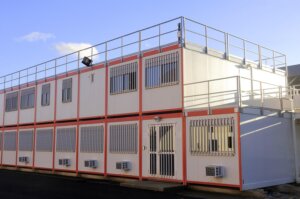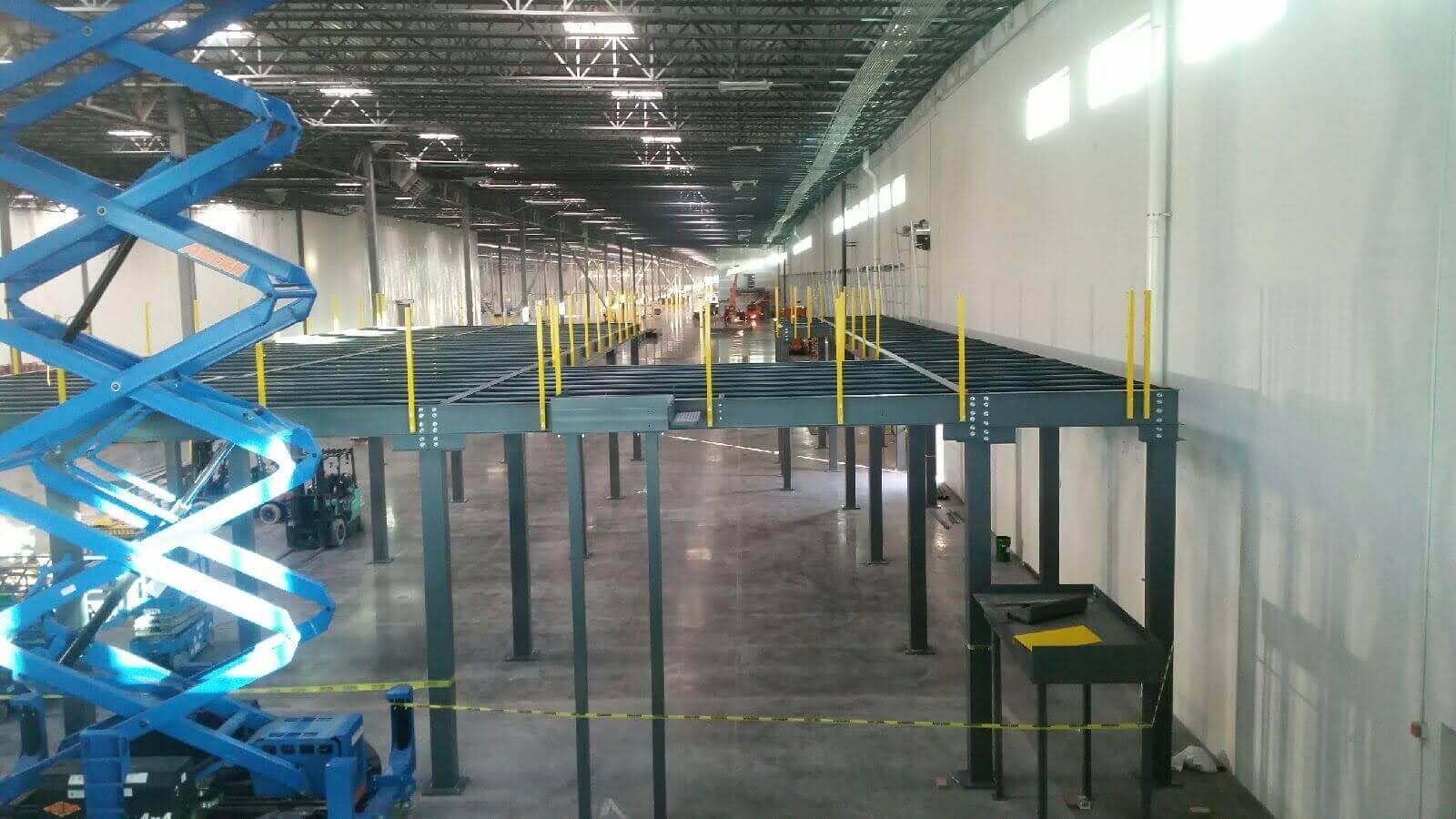What Is A Mezzanine Floor? Definition, Construction & Uses
Introduction
A mezzanine floor, also referred to as a mezzanine level, is a versatile and cost-effective solution for expanding usable space within a building. Industrial Products Plus offers innovative mezzanine floor solutions for businesses looking to optimize their facilities. These intermediate floors are constructed within an existing structure, typically between the ground floor and ceiling. Mezzanine floors offer additional square footage without the need for costly building extensions or relocation.
Importance and Benefits of using Mezzanine Floors in Various Industries
Mezzanine floors play a crucial role in enhancing operational efficiency and optimizing space utilization across a wide range of industries. Some key benefits include:
Maximizing Space Utilization
One of the primary advantages of a mezzanine floor is its ability to make efficient use of vertical space. By creating an additional level within a facility, mezzanines help maximize floor space, which is particularly valuable in crowded urban environments or locations where land costs are high.
Cost-Effective Expansion
Compared to constructing a new building or renting additional space, mezzanine floors are a cost-effective alternative. They require less investment in both time and money, making them an attractive option for businesses seeking to expand without breaking the bank.
Enhanced Workflow and Productivity
Mezzanine levels can be customized to suit specific workflow requirements, allowing for efficient organization and separation of various functions within a facility. This improved layout often leads to increased productivity and smoother operations.
Adaptability and Flexibility
Structural mezzanines, such as those offered by Industrial Products Plus, are highly adaptable and can be easily modified or relocated as business needs evolve. This adaptability provides long-term flexibility that traditional construction methods cannot match.

Definition and Construction of Mezzanine Floors
A mezzanine floor serves as an intermediate level within a building and is a versatile solution offered by Industrial Products Plus for expanding usable space. Its primary purpose is to create additional floor space for various uses, including storage, offices, production, or display areas. Mezzanines are versatile and can be tailored to meet specific requirements.
Different Types of Mezzanine Floors
Mezzanine floors come in several types, each suited to specific applications:
1. Free-Standing Mezzanine
This type of mezzanine is self-supporting and does not rely on the existing building structure for support. It is a popular choice for warehouses and distribution centers, providing additional storage space above the ground floor.
2. Rack-Supported Mezzanine
Rack-supported mezzanines utilize existing pallet racking systems as support structures. They are ideal for facilities with high-density storage needs and are cost-effective solutions for expanding storage capacity.
3. Structural Mezzanine
Structural mezzanines are custom-designed steel structures that can support heavy loads. They are commonly used in manufacturing and industrial settings to create additional production or assembly areas.
4. Office Mezzanine
Office mezzanines are designed to accommodate administrative functions and provide a comfortable workspace. They are often found in industrial facilities, allowing management to oversee operations from a strategic vantage point.
Overview of the Construction Process and Materials used
The construction of a mezzanine floor involves several steps:
Design and Planning
The process begins with a thorough assessment of the available space and specific needs of the business. Engineers and architects, including those at Industrial Products Plus, create detailed plans and designs, ensuring the mezzanine integrates seamlessly with the existing structure.
Structural Analysis
Structural engineers calculate load-bearing requirements and design the mezzanine’s framework accordingly. This step is crucial to ensure the safety and stability of the mezzanine level.
Material Selection
Materials for mezzanine construction typically include steel beams, columns, and decking materials such as plywood or metal grating. The choice of materials depends on the intended use and load-bearing requirements.
Installation
Skilled contractors and construction teams assemble and install the mezzanine structure, taking care to adhere to safety regulations and building codes.
Uses and Applications of Mezzanine Floors
Mezzanine floors, including structural mezzanines, find extensive use in a variety of industries:
Warehousing and Distribution
In warehouses, mezzanines provide additional storage space for inventory, making them indispensable for managing stock efficiently.
Manufacturing
Manufacturers utilize mezzanine levels to expand production areas, accommodate machinery, or create separate workspaces for different production stages.
Retail
Retailers often employ mezzanines for extra sales or display space, optimizing their retail environments and creating a more engaging shopping experience.
Office Spaces
In office buildings, mezzanines can be used to divide open areas into smaller offices or conference rooms, promoting an efficient use of space.
Automotive
Automotive garages and workshops utilize mezzanines for storage, service areas, or offices, improving their overall functionality.
Applications and Benefits of Mezzanine Floors in Each Industry
Warehousing and Distribution
Mezzanine floors allow for organized and accessible storage, reducing clutter on the ground floor and enhancing inventory management. This leads to faster order fulfillment and improved logistical operations.
Manufacturing
In manufacturing, mezzanines provide space for additional machinery or assembly lines, resulting in increased production capacity and improved workflow efficiency.
Retail
Retailers can expand their sales floor, create eye-catching displays, or establish cozy cafe areas, enhancing the shopping experience and potentially boosting sales.
Office Spaces
Mezzanine floors offer the flexibility to adapt office layouts to changing needs, accommodating growing teams or creating private workspaces as required.
Automotive
Automotive facilities benefit from mezzanines by optimizing storage space for parts and equipment, as well as providing separate areas for administrative tasks.
Factors to Consider When Designing and Installing Mezzanine Floors
Considerations for load-bearing capacity and structural integrity
When designing mezzanine floors, such as structural mezzanines, it’s crucial to calculate and account for the load-bearing requirements, ensuring that the structure can safely support the intended use and loads.
Compliance with building regulations and safety standards
Mezzanine construction, including structural mezzanine construction, must comply with local building codes and safety regulations to ensure the safety of occupants and protect against potential hazards.
Integration with existing infrastructure and workflow
Mezzanines should be seamlessly integrated into the existing workflow and infrastructure, minimizing disruptions and optimizing operational efficiency.
Cost and Return on Investment (ROI) Analysis
Factors that Affect the Cost of Installing a Mezzanine Floor
Factors influencing the cost of mezzanine floor installation, including structural mezzanines, include the size of the mezzanine, materials used, required permits, labor costs, and any additional features such as staircases or safety measures.
How to Calculate the Potential ROI of a Mezzanine Floor Investment
Calculating ROI involves comparing the initial investment in mezzanine construction, including structural mezzanine construction, with the expected benefits, such as increased productivity, storage capacity, or sales. The ROI formula helps businesses assess the long-term financial viability of the investment.
Insights on Long-term Cost Savings and Increased Productivity
Mezzanine floors, including structural mezzanines, can result in long-term cost savings by avoiding the need for larger facilities or costly lease agreements. Increased productivity, streamlined operations, and optimized space utilization also contribute to the ROI.
Maintenance and Safety Measures
Tips for Proper Maintenance and Upkeep of Mezzanine Floors
Routine maintenance, including inspections, cleaning, and addressing any structural issues promptly, ensures the longevity and safety of mezzanine floors, including structural mezzanines.
Importance of implementing Safety Measures
Safety measures like guardrails, handrails, non-slip surfaces, and fire protection systems are essential to prevent accidents and ensure a secure working environment for all occupants of mezzanine levels.
Overview of Regular Inspections and Necessary Repairs
Regular inspections by qualified professionals help identify any structural or safety concerns, allowing for timely repairs and maintenance of mezzanine floors, including structural mezzanines.

Conclusion
Industrial Products Plus leads in turnkey material handling solutions and industrial product sales, offering innovative solutions like industrial shelving, pallet racking, and modular office solutions. We prioritize customer satisfaction, maintain a loyal client base, and foster an empowering corporate culture. Contact us for a free quote today.
To conclude, mezzanine floors, including structural mezzanines, are versatile solutions offered by Industrial Products Plus for maximizing space utilization, enhancing productivity, and optimizing operational efficiency across various industries. They offer cost-effective expansion opportunities while complying with safety standards and regulations.
The adaptability and numerous applications of mezzanine floors, including structural mezzanines, make them a valuable asset for businesses seeking to grow, improve their workflow, or enhance their customer experience.
Explore the possibilities of mezzanine floors, including structural mezzanines, to unlock the potential of their existing spaces, improve efficiency, and achieve a solid return on investment with the assistance of Industrial Products Plus. Whether it’s in warehousing, manufacturing, retail, or office spaces, mezzanines offer a smart solution for expanding and optimizing space. Call us at (714) 641-8100 for more information.
FAQs
FAQ 1: What is a Mezzanine Floor?
A: A mezzanine floor, also known as a mezzanine level, is an intermediate level constructed within an existing building to create additional floor space for various purposes.
FAQ 2: How Can Mezzanine Floors Benefit My Business?
A: Mezzanine floors are cost-effective solutions that maximize space utilization, enhance workflow and productivity, and provide adaptability and flexibility. They can help businesses expand without the need for expensive building extensions or relocations.
FAQ 3: What Industries Commonly Use Mezzanine Floors?
A: Mezzanine floors find extensive use in industries such as warehousing, manufacturing, retail, offices, and automotive. They offer specific applications and advantages tailored to each industry’s needs, from efficient storage solutions to enhancing the customer experience in retail spaces.

